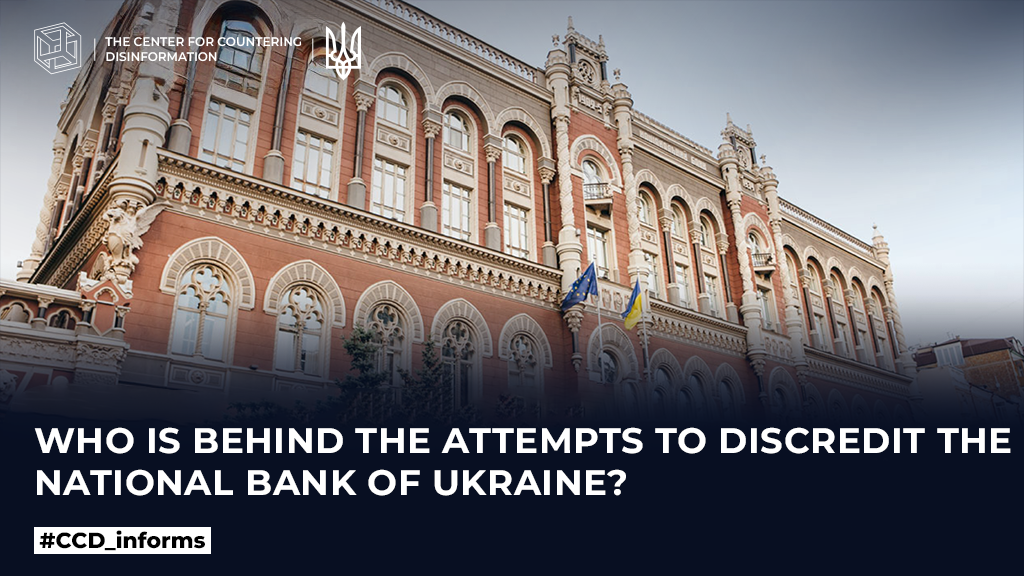Since March 2023, there has been an increase in the dissemination of misinformation aimed at discrediting the work of the National Bank of Ukraine in maintaining macrofinancial stability, undermining external financial assistance measures, and creating distrust in the National Bank’s team.
Unreliable information is being spread more frequently, claiming the continuation of monetary emissions, the inability to control inflation, the threat of a new “banking crisis,” and a rapid devaluation of the hryvnia. The enemy doesn’t even attempt to adapt these disinformation campaigns to the current situation, instead aiming to create an alternative reality for readers who are not particularly interested in up-to-date economic news.
A distinct stage of the disinformation campaign aimed at discrediting the National Bank of Ukraine and the government as a whole is the formation of the notion that the new cooperation program with the IMF is disadvantageous for Ukraine. Similar to previous programs, the arguments put forth by Russian propagandists rely on unsubstantiated populist claims or outright deception, counting on readers not verifying the information or delving into the details.
Who is behind the discrediting campaign of the National Bank?
The collective evidence suggests that a deliberate information-psychological operation (IPSO) targeting the National Bank of Ukraine is being carried out, exhibiting characteristics in terms of goals, timing, and targets that are typical of Russian intelligence services.
Firstly, the campaign to discredit began against the background of increased efforts by the National Bank of Ukraine aimed at preventing the activities of entities linked to Russia in Ukraine, accelerating the exit of international banking groups from Russia, excluding Russia from FATF, and intensifying sanctions pressure on it.
Secondly, the dissemination of fake information follows typical patterns: initially active promotion through Telegram channels from the Russian sphere of influence, followed by coverage in Russian media and, to some extent, English-language media accessible to the Kremlin. Several marginal Ukrainian speakers with doubtful reputations have also been identified, consistently participating in such discrediting efforts.
Thirdly, as for previous Russian IPSOs, this campaign is characterized by a lack of factual evidence, reliance on speculation and subjective judgments, emotional and one-sided presentation of negative generalizations, and biased assessments.
To illustrate, pro-Russian resources recently seized upon a sensitive issue for Ukrainians regarding payments to servicemen, specifically in the context of discrediting the National Bank of Ukraine and cooperation with the IMF. Information was spread suggesting that the National Bank was opposed to providing additional payments to Ukrainian soldiers because, according to Russian propagandists, the IMF insisted on it, allegedly “hitting Ukraine’s rear.” A notable indicator of the Russian IPSO was the involvement of a former prime minister under the Yanukovych regime, who is currently in Russia, in the campaign.
In fact, the positions of the main parties are as follows:
- The head of the National Bank of Ukraine, A. Pysaruk, stated that such decisions “do not assist Ukraine in negotiations with international partners, including the IMF.”
- IMF representative in Ukraine V. Stepanyan said that “such measures are practically impossible without a negative impact on the economy and financial market”;
- the leaders of the Armed Forces also criticized the current project and proposed to assemble a working group to create a new law on the remuneration of military personnel.
In general, the entire financial and economic sector of the state is working to ensure uninterrupted financing of the Armed Forces of Ukraine and decent payment, without provoking crisis phenomena in the economy.
Why has the information-psychological operation (IPsO) been intensified by Russia now?
The National Bank of Ukraine has managed to ensure the stable operation of the banking system amidst the war, and the exchange rate of the hryvnia has remained resilient even during missile attacks and power outages caused by Russia. These achievements of the National Bank have been recognized internationally, with the bank receiving the prestigious “Central Bank of the Year” award from the Central Banking Awards.
Since January 1, 2023, the National Bank, together with the Ministry of Finance of Ukraine, has been providing seamless financing for the needs of the Armed Forces, which has already had a positive impact on slowing down inflation and stabilizing the exchange rate.
The new cooperation program with the IMF has enabled Ukraine to receive a credit of $15.6 billion and has opened access to a broader package of international assistance totaling $115 billion.
Supremely, the National Bank has intensified measures aimed at weakening Russia’s ability to finance a full-scale war. Ukraine has implemented sectoral sanctions against the entire Russian financial sector, FATF has suspended Russia’s membership, joint efforts with the European Central Bank are being made to accelerate the withdrawal of international banking groups from Russia, and enhanced financial monitoring has prevented the use of shadow schemes for income generation by entities associated with Russia and the Russian-backed separatist entities in Ukraine.
Precisely because of the effective work of the National Bank, the main objective of the IPsO to discredit the financial system was the formation of a negative image of the team. One of the fakes spread by the pro-Russian network of telegram channels was a photo and video that featured a premium car, which, as claimed, belongs to the Head of the NBU. The initiator of the “stuffing” on this topic was a person already under US sanctions for participating in Russian measures to influence the electoral process. In fact, all photo and video materials were staged and had nothing to do with the Head of the NBU.
According to the results of the investigation of the journalist-fact checker of the American edition of Newsweek Tom Norton, these measures were nothing more than an information attack on the Head of the NBU by entities associated with the Russian Federation.
Thus, the Kremlin is trying to undermine the credibility of the main financial institution of Ukraine, to provoke panic behavior of the population and to reduce international support for Ukraine, thus weakening the ability of our state to finance defense needs. There is reason to believe that discrediting the financial system of Ukraine, in particular the National Bank, from Russia will continue and focus on misinforming the audience of Western partner states of Ukraine in order to weaken its international support.
4 May, 2023










